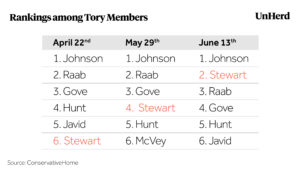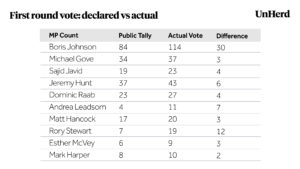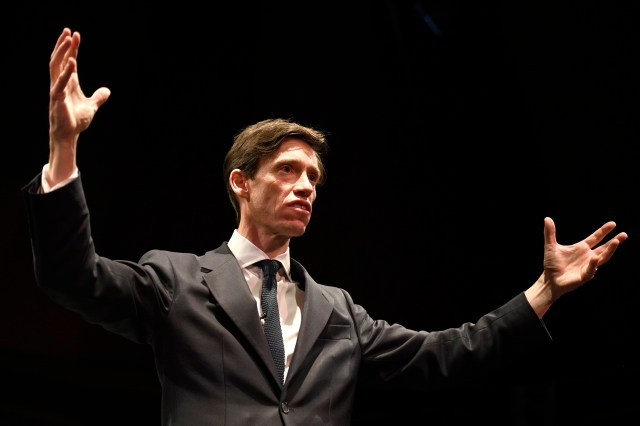Rory Stewart launches his bid to become leader. Credit: Leon Neal/Getty Images

The first round votes are in from Conservative MPs, and the big story is Boris Johnson’s seemingly unsurmountable lead. With 114 of the 313 Tory MPs having backed the former London mayor, he has secured over a third of the parliamentary party and is firmly shrouded in that dangerous garment, the ‘cloak of inevitability’.
Yet look down the list (now down from 10 to seven) and one unlikely name has made it through to the next round – against expectations and against logic. Yes, Rory Stewart, the Where’s Wally? of the 2019 Tory leadership election, survives to see another day.
It’s odd. He was not supposed to figure in this race at all. Mention his name to insiders and you’d usually get an affectionate smile, a shake of the head, and a sigh: “Ah, dear Rory.” Yet even if he doesn’t make it any further, he has already achieved something remarkable – and proved an important point.
We live in an era of targeted, professionalised politics. Successful campaigns these days are at best the masterplans of tacticians such as Lynton Crosby, or at worst the result of black-box Facebook algorithms that tell you exactly what you want to hear without you realising it. Even in a general election campaign, success is supposed to come from professional pollsters slicing and dicing the electorate into ‘segments’ that can be ‘targeted’.
In the case of the Conservative leadership election, this should be even more true. The electorates in this campaign come ready-divided into concentric circles: at the centre, the 313 Tory MPs whose primary motivation seems to be to survive and keep their jobs; outside them, the 160,000 or so Tory members who will vote on the final two candidates; and finally, the general public who (we are repeatedly reminded) have no say in this momentous decision.
The other leadership candidates have understandably focused their promises on the second of these three, with ‘red meat’ stances designed to appeal to the stereotypical Tory member: shutting down parliament in order to push through a no-deal Brexit (Raab), cutting back legal abortions from 24 weeks to 12 weeks (Hunt), slashing income tax for higher earners (Johnson). This last pledge in particular, surprising and unpopular with the commentariat, had the whiff of a pre-polled Lynton Crosby policy (he is running Boris’s campaign).
Meanwhile, Stewart’s has been quite unlike these modern professional campaigns. His central message of compromise on Brexit is exactly the opposite of what Tory members want to hear – according to YouGov 66% of them are in favour of no-deal. During his leadership launch event on Tuesday, he flirted with the idea of supporting a Labour motion to take no deal off the table, to confusion in the audience and in the press. Why would he do that? What on earth is his strategy?
He has seemed to take great pleasure in the illogic, the unprofessionalism, of his campaign. He told a campaign audience that polling guru John Curtice had given him a tip: his message of compromise might have worked 20 years ago when voters were arranged in a bell-curve, clustered around the centre, but these days voters are arranged in a U-shape, clustered around each end. The moderates he is pursuing, he was told, simply don’t exist any more. Stewart laughed heartily as he told the story.
And yet this non-strategy has already been successful. Among the general public, he is the only candidate to have become dramatically more noticed, and dramatically more liked. In one 10-day period between 23 May and 3 June, he moved from 19% of the public having an opinion about him to 29%, and most of that new-found fame was positive. That’s a lot of new fans. (During the same period, minding his public appearances, Boris actually managed to get 2% less famous).
Among voters who know who he is, Rory is now the most popular candidate to become prime minister.
The conventional wisdom has been that while he may be fleetingly popular with the those such as Gary Lineker and James O’Brien, the hardcore base of the Conservative party membership will be the last people on earth to be seduced. So it has caused considerable head-scratching to observe him steadily climbing the rankings in the regular ConservativeHome members’ survey, until this morning he moved into second place after Boris Johnson.

With this he has usefully proved that while voter ‘segments’ may look coherent on a pollster’s spreadsheet, they are not: even Conservative party members are three-dimensional human beings. They are not the Brexit-only automatons of the public imagination: they watch the news, they think about other things, some of them are even open-minded.
Stewart appeals to different Conservative traditions of prudence and common sense that, it turns out, are still alive among the membership. What’s more, despite what pollsters will tell you, he has shown that a convincing leader can actually change people’s minds. His frenetic, undirected campaign that has consisted mainly of saying exactly what Tory members don’t want to hear has already proved surprisingly popular with… Tory members.
Conservative MPs have hardly flocked to him – he squeaked through with only 19 votes. And yet even here, compared to the tally of seven publicly declared MPs only this morning, he has surpassed expectations. Even among this elite electorate, he can still legitimately claim momentum.

In the next round of voting on 18 June, candidates will need 34 or more votes to survive. This may be too high a bar for Rory Stewart. But his biggest hope should rest in the fact that he has already proved something many of his fellow MPs desperately want to be true: that a more instinctive, old-fashioned political campaign that aims to change minds instead of following existing opinion can be surprisingly successful.










Join the discussion
Join like minded readers that support our journalism by becoming a paid subscriber
To join the discussion in the comments, become a paid subscriber.
Join like minded readers that support our journalism, read unlimited articles and enjoy other subscriber-only benefits.
Subscribe